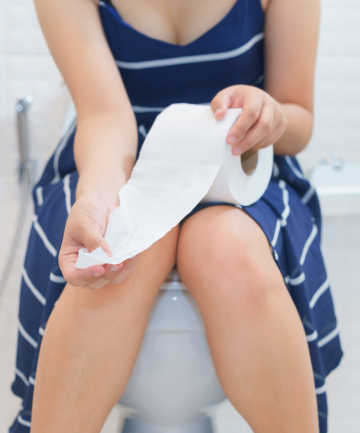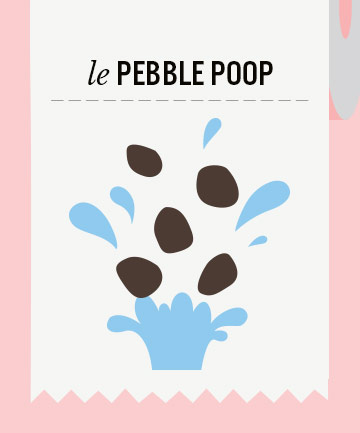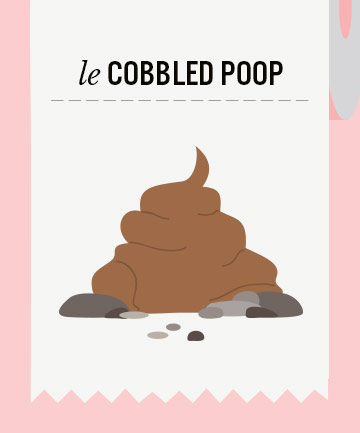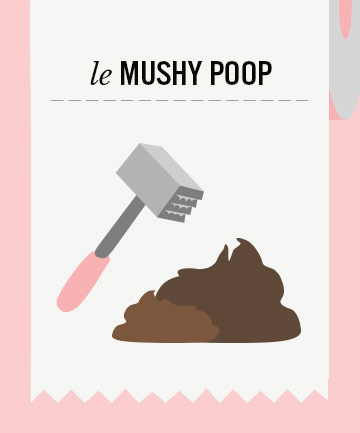Ever had a poop throw you for a loop? The kind of poop that leaves you looking down at the toilet, thinking, 'How did that come out of me?' Or perhaps you consistently churn out the same kind of stool over and over again, but don't really know if it's normal because, well, you don't really spend a whole lot of time comparing it to other people's poo. Alternatively, you may not even take a peep at your poop because, ew, it's poop.
That latter way of thinking can be a mistake because poop can reveal a lot about our bodies — and clue us in to potentially serious health problems. But since the stool spectrum is pretty wide — and you're no dookie detective — it can be difficult to know what every single type of stool indicates.
That's where gastroenterologist Dr. Anish Sheth, MD, comes in. The author of "What's Your Poo Telling You," he literally wrote the book on poop. And he's here to help us decipher defecation, filling us in on everything from what green poop to floaters mean, as well as the types of bowel movements that can point to worrisome issues like ulcers or even colon cancer.
Here, the word on your turds — and what they're telling you about your body.
Image via Kittisak Jirasittichai/EyeEm/Getty
That latter way of thinking can be a mistake because poop can reveal a lot about our bodies — and clue us in to potentially serious health problems. But since the stool spectrum is pretty wide — and you're no dookie detective — it can be difficult to know what every single type of stool indicates.
That's where gastroenterologist Dr. Anish Sheth, MD, comes in. The author of "What's Your Poo Telling You," he literally wrote the book on poop. And he's here to help us decipher defecation, filling us in on everything from what green poop to floaters mean, as well as the types of bowel movements that can point to worrisome issues like ulcers or even colon cancer.
Here, the word on your turds — and what they're telling you about your body.
Image via Kittisak Jirasittichai/EyeEm/Getty
What it Looks Like: What's the No. 1 of No. 2s? We may have major #squadgoals, but our poop is at its best when it steps out solo. Yep, according to Sheth, "The ideal stool is soft, cohesive and eliminated in a single piece." (Think of it as an un-dumpable dump, because it is already single.) But what shape does the lone wolf of turds come in? The form doesn't matter as much as the aforementioned characteristics, but Sheth explains this type of stool might take on a coiled or S-shaped look, because it's pliable enough to conform or bend to the shape of the toilet bowl. But, again, if you have a no-frills, log-shaped poop that's soft and eliminated in a single piece, you're still in decent dookie territory. Other attributes of a healthy stool include a light brown color (think peanut butter), and failure to leave a foul odor or much of a residue on toilet paper. Basically, it exhibits the least sh*tty behavior on the spectrum of actual sh*ts.
What It Means: "If you have enough fiber in your diet, your stool is going to be more cohesive, so it's not going to break apart in small little pieces," says Sheth. Additionally, Sheth explains that this type of poop indicates your gastrointestinal tract is, in general, working properly and that "things aren't hanging around too long or moving too quickly, but baking for the right amount of time." Kind of gives new meaning to the term bun in the oven, no?
What It Means: "If you have enough fiber in your diet, your stool is going to be more cohesive, so it's not going to break apart in small little pieces," says Sheth. Additionally, Sheth explains that this type of poop indicates your gastrointestinal tract is, in general, working properly and that "things aren't hanging around too long or moving too quickly, but baking for the right amount of time." Kind of gives new meaning to the term bun in the oven, no?
What It Looks Like: Falling to pieces isn't good for us — or our poop. If you're finding rabbit-like poop pellets in your toilet and you don't have an impressively potty-trained pet, then you've got yourself a case of pebble or particulate stool. According to Sheth, this type of stool tends to be hard, very desiccated and sometimes darker in color than the light brown color of a healthy bowel movement.
What It Means: "A lack of stool cohesion can be a sign of constipation, and is really indicative of a lack of dietary fiber," says Sheth. "If people have to eliminate stool in very small pieces, clearly this is not satisfying -- people don't feel like they've completely evacuated." So, basically, your lack of fiber can literally have you feeling like you're full of sh*t. Not to mention the fact that eliminating poop pebbles makes a pretty distinct plopping sound that always seems to be amplified when you're spending the night at that new beau's place with the razor-thin walls. If there's a better reason to pick up fiber-rich foods like whole grains, fruits and vegetables, we'd like to hear it.
What It Means: "A lack of stool cohesion can be a sign of constipation, and is really indicative of a lack of dietary fiber," says Sheth. "If people have to eliminate stool in very small pieces, clearly this is not satisfying -- people don't feel like they've completely evacuated." So, basically, your lack of fiber can literally have you feeling like you're full of sh*t. Not to mention the fact that eliminating poop pebbles makes a pretty distinct plopping sound that always seems to be amplified when you're spending the night at that new beau's place with the razor-thin walls. If there's a better reason to pick up fiber-rich foods like whole grains, fruits and vegetables, we'd like to hear it.
What It Looks Like: Your retirement plan, that important work presentation, your poop — these are all things that you don't want cobbled together. But a cobbled poop isn't something that is hastily put together (more on that in a bit), but rather a stool with a lumpy, uneven surface that resembles cobbles — and in no way evokes the charm of the cobblestone streets you roamed during your semester abroad.
What It Means: According to Sheth, cobbled poop usually gets its uneven surface because there are areas of the stool that have become hard and firm due to getting dried out from sitting in the colon for too long. Since, as Sheth explains, the colon's primary function is to absorb water, if your stool hangs out in the colon for too long, it'll leave as a pretty parched poop. This can occur when people have slow colons — which can be caused by anything from lifestyle choices (think an overly sedentary lifestyle) to medications to hormonal changes during pregnancy.
Additionally, bumpy bowel movements with irregular surfaces can be a sign that you have mild constipation and that you're not getting enough fiber and water. Sensing a pattern here?
What It Means: According to Sheth, cobbled poop usually gets its uneven surface because there are areas of the stool that have become hard and firm due to getting dried out from sitting in the colon for too long. Since, as Sheth explains, the colon's primary function is to absorb water, if your stool hangs out in the colon for too long, it'll leave as a pretty parched poop. This can occur when people have slow colons — which can be caused by anything from lifestyle choices (think an overly sedentary lifestyle) to medications to hormonal changes during pregnancy.
Additionally, bumpy bowel movements with irregular surfaces can be a sign that you have mild constipation and that you're not getting enough fiber and water. Sensing a pattern here?
What It Looks Like: Not quite diarrhea, not quite a fully formed poop, this bowel movement middleman is soft, loose and totally non-cohesive. People who eliminate waste in this manner will find that clean-up is, well, a pretty sh*itty process. They may also have multiple mushy bowel movements per day that may have them throwing their hands up and thinking, 'Poop, can you do me a solid? Like, literally?'
What It Means: According to Sheth, you can see this type of stool in people with irritable bowel syndrome, lactose intolerance or celiac disease. "If you're eating something that you're body's not able to process, the end result, for the most part, is that you're going to have more frequent and looser bowel movements," says Sheth. He's quick to point out that these are broad generalizations and that if your have a sudden onset of mushy poops that get worse and worse, it's best to consult a doctor. Consider it a well-formed plan of attack to counter your poorly formed poop.
What It Means: According to Sheth, you can see this type of stool in people with irritable bowel syndrome, lactose intolerance or celiac disease. "If you're eating something that you're body's not able to process, the end result, for the most part, is that you're going to have more frequent and looser bowel movements," says Sheth. He's quick to point out that these are broad generalizations and that if your have a sudden onset of mushy poops that get worse and worse, it's best to consult a doctor. Consider it a well-formed plan of attack to counter your poorly formed poop.








